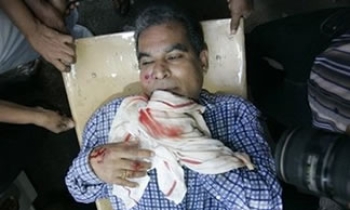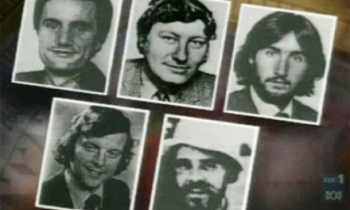BBC correspondent Alan Johnston began Monday his third week in captivity in the Gaza Strip wven as efforts were stepped up to secure his release. Reporters sans Frontières (RSF) urged leaders attending an Arab League summit on March 28-29 in Saudi Arabia to issue a joint appeal for his release.

“An appeal issued in Riyadh by all the Arab heads of state could make a major contribution to the resolution of this hostage situation,” RSF said. “We are getting more and more concerned about Johnston. There has been no news about him for two weeks. None of the journalists kidnapped in the Gaza Strip since 2005 has been held for such a long time.”
RSF said, “If it is true that the Palestinian authorities know the identify of his kidnappers, as many local sources claim, we call on them to conduct negotiations as quickly as possible so that Johnston can be reunited with his family. His abductors have not made their demands public.”
BBC's Jerusalem bureau chief, Simon Wilson, expressed gratitude for the international support the BBC had received, but urged all individuals and parties with any influence to work "tirelessly" to secure Alan Johnston's release.
His call was echoed by the head of the Palestinian Press Association , Sakr Abu al-Aoun, who said the Palestinian authorities and different factions must to do everything possible to free the missing reporter.
Palestinian journalists staged another demonstration Sunday at the Unknown Soldier Square in Gaza City in protest against the British journalist’s abduction. A large photo of Johnston has been put on display in the city centre.
BBC’s Middle East bureau chief, Samuel Johnston, addressed the protestors, voicing concern over the fate of the hostage. “We know that everybody is working, we know how much Alan meant to Gaza, as we received messages of support,” Johnston told reporters. He maintained that so far BBC has not received any information as to the whereabouts of the abducted reporter.

BBC Monday set up a satellite link between Gaza and Television Centre so staff and supporters could exchange messages of support on giant screens. Director-General Mark Thompson praised Johnston's commitment for reporting from Gaza in very difficult conditions. He described Johnston as "one of those amazing BBC people who make extraordinary sacrifices and take considerable risks because they believe a story needs to be told."
Johnston, 44, was seized by four armed men in a white Subaru as he was driving near the BBC’s Gaza City office on Al-Wihdah Street around 2 pm on March 12, according to Committee to Protect Journalists (CPJ) sources in Gaza. Johnston was quickly identified because he threw his business card on the street, according to news reports. No claim of responsibility was made and the motive for the kidnapping remained unknown, local journalists told CPJ. Last week, Hamas spokesman Ghazi Hamad said the abduction was “on its way to being solved” and that authorities had “definite information regarding the parties behind this kidnapping.”
A total of 14 foreign journalists have been kidnapped in the Gaza Strip since August 2005, according to RSF. Most of them were quickly released unhurt. In one case, two US journalists were held for 14 days. Their abduction was claimed by the hitherto unknown Holy Jihad Brigades, which for a while was demanding the release within 72 hours of all Muslims held by the United States.
During a fact-finding visit in December last, RSF was told by many observers that the two Americans were held longer than other hostages because of their nationality. Nonetheless, the kidnappers appear not to have been motivated by any political considerations in the other 12 cases.









